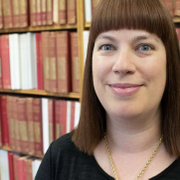- Level Foundation
- Duration 26 hours
- Course by University of London
-
Offered by

About
This course introduces learners to applied public history: understanding and interpreting the past today, and engaging diverse communities in the practice of making and sharing histories. The course draws on project case studies, expert insights and diverse perspectives to model exciting approaches to researching and sharing the history of places and people. Learners will develop a toolkit to apply in their own practice, by participating in discussion, quizzes, creative activities and mini masterclasses. What kinds of stories can we discover through research into the history of places and people? How do we engage diverse communities with those stories today? What kinds of imaginative approaches can we use to interpret the past? And what tools and opportunities can we create to include new groups and individuals in local research initiatives? Led by the Centre for the History of People, Place and Community at the Institute of Historical Research, University of London – the UK’s national centre for history – this course investigates these questions and helps learners develop transferable approaches to their own local history and heritage interpretation.Modules
Describing Your Place
1
Assignment
- Describing a historic place
1
Discussions
- Welcome! Introduce yourself and your place
2
Videos
- Welcome! Introducing the Course
- Describing a historic place: interview with Matthew Bristow (Historic England / Victoria County History)
Historic Buildings
1
Assignment
- Describing a historic building
1
Discussions
- Describe a historic building or place
1
Videos
- Historic Building Case Study: interview with Matthew Bristow (Historic England / Victoria County History)
1
Readings
- Describing Buildings: Historic England Guidelines
Maps and Stories
1
Assignment
- Places
2
Videos
- Discovering Old Maps (Interview with Dr Matt Shaw, Librarian, IHR Wohl Library)
- Layers of London and Crowdsourced Deep Mapping
1
Readings
- Explore Layers of London
Collecting and Telling Stories
1
Assignment
- Collecting and Telling Stories
1
Videos
- Youth Club Archive
1
Readings
- Explore Youth Club Archive
Stories through Objects
1
Peer Review
- Object and Caption
1
Videos
- Red Boxes: Victoria County History
1
Readings
- Explore the Red Boxes Collections
Personal Stories, Oral Histories
1
Assignment
- Discovering Stories
1
Discussions
- Oral Histories
1
Videos
- Syrian Oral Histories: Interview with Waseem Albahri
History and Creative Arts
1
Assignment
- History and Creative Arts
1
Videos
- History and Art: reflections on creative collaboration
1
Readings
- History, Creativity, and Participation
History and Performance
1
Assignment
- History and Performance
1
Discussions
- Getting into Character...
1
Readings
- Living history and performance
Creative Mapping
1
Assignment
- Public History and Creative Practice
1
Discussions
- Make and Share a Creative Map
2
Videos
- Interview with Illustrator Tom Woolley
- Creative Mapping Masterclass
Place and Commemoration
1
Assignment
- Place and Commemoration
1
Discussions
- Monuments and Memorials
1
Videos
- #RememberHer: Interview with Amy Todd
1
Readings
- #RememberHer
Anniversaries
1
Assignment
- Anniversaries
1
Discussions
- Remembering / Forgetting?
1
Videos
- Haringey Peace Forum: Interview with John Hinshelwood
History and Activism
1
Assignment
- History and the Present
1
Videos
- History Workshop Online
1
Readings
- Investigate History Workshop Online
What is Co-Production?
1
Assignment
- What is co-production?
1
Videos
- Layers of London: History of My School and other crowdsourced projects
1
Readings
- Reflecting on co-production
How do we do Co-Production?
1
Assignment
- How do we do co-production?
1
Discussions
- What works?
1
Videos
- Victoria County History: Ibstock
1
Readings
- Explore co-produced histories
Why Co-Production?
1
Assignment
- History and co-production
1
Discussions
- What words?
1
Readings
- Our Migration Story: interview with Sundeep Lidher and Malachi McIntosh
Media Engagement
1
Assignment
- Media Engagement
1
Discussions
- Media Engagement: Sharing Experiences and Suggestions
1
Videos
- Media Engagement: Insights from the 'Being Human' Festival
1
Readings
- Writing a Media (Press) Release
Sharing your Stories Online
1
Peer Review
- Share your story in 280 characters (a 'tweet' / post on X)
2
Readings
- Writing for the Web
- Social Media: The Institute of Historical Research on social m
Reflection and Evaluation
1
Assignment
- Communication and Evaluation
1
Discussions
- Evaluating your participation in this course
1
Videos
- Evaluating your project: reflections from our partners
Auto Summary
Explore the fascinating world of applied public history with this engaging course, "Applied Public History: Places, People, Stories." This program, delivered by the Centre for the History of People, Place and Community at the Institute of Historical Research, University of London, delves into the practice of interpreting and sharing the past in today's context. Participants will learn to research the history of places and people, uncovering compelling stories and engaging diverse communities in the process. The course features project case studies, expert insights, and diverse perspectives, offering innovative approaches to historical research and community engagement. Throughout the course, learners will build a practical toolkit through discussions, quizzes, creative activities, and mini masterclasses. They will explore imaginative methods for interpreting the past and discover ways to involve new groups and individuals in local research projects. With a total duration of 1560 minutes, this foundational-level course is perfect for anyone interested in arts and humanities, particularly those keen to explore public history. Subscription options are available in both Starter and Professional tiers, making it accessible for different levels of commitment and expertise. Whether you're a history enthusiast, a community leader, or a professional in the heritage sector, this course provides valuable skills and insights to help you engage with history in meaningful and impactful ways.

Catherine Clarke


